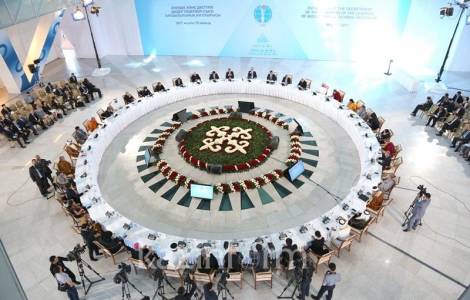
Astana (Agenzia Fides) - More than 80 delegations have been invited to take part in the work of the VI Congress of world and traditional religions leaders, scheduled in Astana (Kazakhstan) on Wednesday 10 and Thursday 11 October. The number of delegations present at the event was confirmed on Monday 8 October by the Kazakh Foreign Ministry spokesman Aibek Smadiyarov. At the Congress, entitled "Religious leaders for a safe world", Kazakh President Nursultan Nazarbayev will be present along with representatives of Islam, Christianity, Buddhism, Judaism, Hinduism, Taoism, Zoroastrianism and members of religious and civic organizations. The event will also see the participation of Serbian President Aleksandar Vucic and the Secretary General of the Organization for Security and Cooperation in Europe, Thomas Greminger. One of the four sections of the work will be dedicated to the contribution that religious leaders and politicians are called to offer to overcome extremism and terrorism".
The First Congress of World and National Traditional Religions was convened by President Nazarbaiev in Astana on 23 and 24 September 2003. On that occasion, high-level delegates sent by 17 religious and confessional institutions from around the world sat at the big round table in the hall of Saltanat Saraiy, the palace of ceremonies, among red tapestries and turquoise columns, to "relaunch" the watchwords of dialogue and religious freedom from the heart of Eurasia, that is close to Afghanistan, Pakistan, Iraq, Azerbaijan, in that Central Asian area that for the theorists of the clash between civilizations represented the epicenter of all ethnic-religious conflicts that disturb the globalized world.
That Congress, right from the programmatic declarations of the organizers, had the Day of Prayer for Peace in the World as a model, convened in Assisi by John Paul II on January 24, 2002, to reaffirm the positive contribution of the different religious traditions to dialogue and harmony among peoples and nations. Also the two days of Astana had the intent to refute the post-September 11th mental climate, which identified in the religious factor the cheap fuel of the new geopolitical conflicts. Already on that occasion, the Holy See was represented at the interreligious forum of Astana by a high-level delegation led by Cardinal Jozef Tomko (who was Prefect of the Congregation for the Evangelization of Peoples from 1985 to 2001, and at that time was President of the Pontifical Committee for International Eucharistic Congresses (GV) (Agenzia Fides, 9/10/2018)